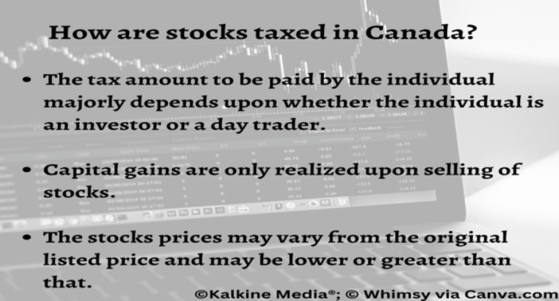Highlights
- The tax amount to be paid by the individual majorly depends upon whether the individual is an investor or a day trader.
- Capital gains are only realized upon the selling of stocks.
- The stock prices may vary from the original listed price and may be lower or greater.
Stock options are a financial tool that provides the liberty to the option holder to sell or buy either full or shares of certain stocks. These shares can be sold at a specific duration and at a certain price. The stock prices may vary from the original listed price and may be lower or greater. Also, these stocks have an expiry date.
The stock option holder has to decide to buy or sell those shares before the expiry date. Many companies are now offering stock options as financial incentives to their employees. With these stock options, the employees have the leverage to buy company stocks at a discounted rate. Employers can offer several different options to their employees.
How are stocks taxed in Canada? The tax amount to be paid by the individual majorly depends upon whether the individual is an investor or a day trader. The Canada Revenue Agency (CRA) operates with a superficial loss rule that prevents the day traders and others from participating in transactions.
The traders are prevented from participating in transactions that aim to realize capital losses on stocks, only to buy back the same stock immediately afterwards. The rule is applicable for 30 days before and after the sale transaction.
- As a day trader
- As an investor
The capital gains are incurred upon the selling of stocks. They are also applicable to exchange-traded funds (ETFs) and mutual funds.
What are capital gains? In Canada, the entire capital gain realized on the stocks is not taxed. Only half of the amount is eligible for tax. The other half of the amount is declared tax-free. The total amount to be paid depends upon the total capital gain realized on the stocks and the tax bracket.
If there are any foreign currency capital gains, they must be reported with their exact date of purchase and sale. Also, the reporting currency has to be Canadian dollars.
Bottom Line: It is crucial to go for the right investing way and use the capital gains to your benefit. If you are taking any stock decision, it may have consequences followed by tax consequences. Hence, it is important to understand the tax implications correctly.
Making the right investment decisions can maximize your investment portfolio’s potential and minimize the tax and risk factor involved.
Please note, the above content constitutes a very preliminary observation based on the industry and is of limited scope without any in-depth fundamental valuation or technical analysis. Any interest in stocks or sectors should be thoroughly evaluated taking into consideration the associated risks.
